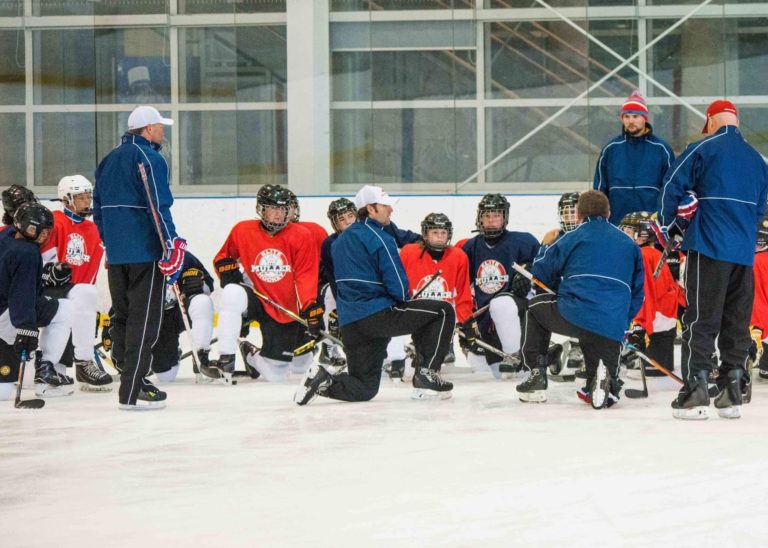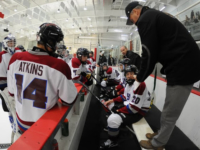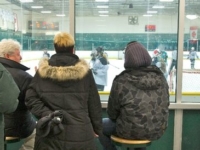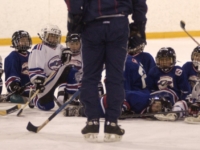As a youth hockey coach, you dedicate a lot of your spare time, weekends, and early mornings to coaching these kids. It is for the love of the game and the love of the players. Nurturing our next generation of youth athletes not only allows them to reach their potential, but it provides structure and discipline in their lives that only sports can provide. It takes a lot of commitment and energy, but at the end of the season, it’s all worth it.
Occasionally you will have to deal with difficult players. Now you might be wondering how difficult a peewee hockey player can be. After all, they’re just kids. Let’s understand that difficult players are not necessarily ones that give you attitude or talk back. Difficult players can be disruptive to the locker room and have a negative impact on the enjoyment of other players on the team. Now, this is where coaching can become a difficult task. A lot of the time, a player’s issues may stem from their parents.
Speaking with Hockey Parents
Hockey parents have an interesting reputation when it comes to youth sports. You have no doubt seen videos of hockey parents getting into arguments and even full-out fights in the stands. It is a sport that ignites the passion in all of us, especially those of us who grew up in Canada. Dealing with hockey parents can be a challenge on most days, especially when you want to discuss a problem with their child.
The thing with difficult young players is you never really know what is going on at home. All you see of the player is what happens at the rink. Often when parents are dealing with a separation or shared custody, there will be different experiences with how the child attends practices and games. The player might be late every time they are with one of the parents, or worse, not show up at all.
As children, this is hardly their fault. In fact, hockey is often an escape for these kids so you have to be sympathetic to their situations. Addressing their parents might not be ideal, but it is the fastest way to get to the root of the problem.
Distracted or Uncooperative Players
Of course, sometimes it truly is the players themselves. It’s not an easy age to keep the attention of kids, especially those who are used to playing video games and always having their eyes on a screen. In fact, believe it or not, some kids are there against their will and it is their parents who want them to play hockey.
So how do you deal with these players? As a coach, it really is up to us to keep things interesting so that we can hold the attention of our players. You can’t just run the same practice and drills over and over. Kids need variety and besides, changing things up helps them to develop their skills and form a more complete game on the ice.
Keep the kids moving so that they don’t have a lot of time to stand around and let their minds wander. Challenge them mentally and physically, and they will respond. This goes for games too. At such a young age you can let players try different positions. Once they find something they enjoy, it becomes a lot easier to get through to them.
Positive Reinforcement, Not Negativity
A major part of coaching is knowing how your players will respond to both positive and negative reinforcement. Young players need positive reinforcement to build their confidence both on and off the ice. When your players do something well, and even when they don’t, reinforce that you support them even when they make mistakes on the ice.
Should you ever use negativity as a coach? It’s an interesting question to think about. At a young age, it doesn’t really make sense to punish your players for not listening or being disruptive. Punishing them with things like backward circles or wind sprints will only get you so far. Not only will it actually build some resentment from the players, but it also disrupts the ability to actually coach them and develop real skills.
Remember, you’re supposed to be a source of leadership and authority in their lives. You can discipline players without turning them against you. And never forget to reinforce that positivity when they do things well because that reinforcement will mean a lot more to them than another set of wind sprints!
Summary: Coaching Challenging Players
Every youth hockey player is unique in their own way. Some will listen to every word you say while others will treat practices and games as a time to just have fun with their friends. If you find a player’s behaviour to be disruptive to the team, it is your job as the coach to step in and provide a solution.
Is it the child or the parents that are causing the difficulties? If a parent cannot get their child to the game on time then it affects the entire team. While the child might not be being intentionally difficult, it certainly makes things harder on you as the coach.
Remember that children at this age need to be reminded that they are doing things well. This positive reinforcement is vital in potentially changing them from a difficult player to a cooperative one. There is rarely a need for negativity or punishments in youth sports. If a player is being difficult, love and respect will build a much stronger bridge than harsh discipline. Always keep in mind what role you play in their lives and how you can provide the building blocks for their future, no matter how difficult they may be acting!






